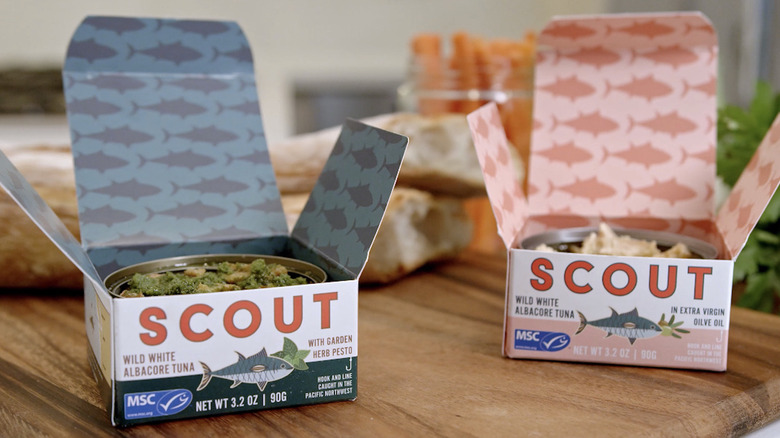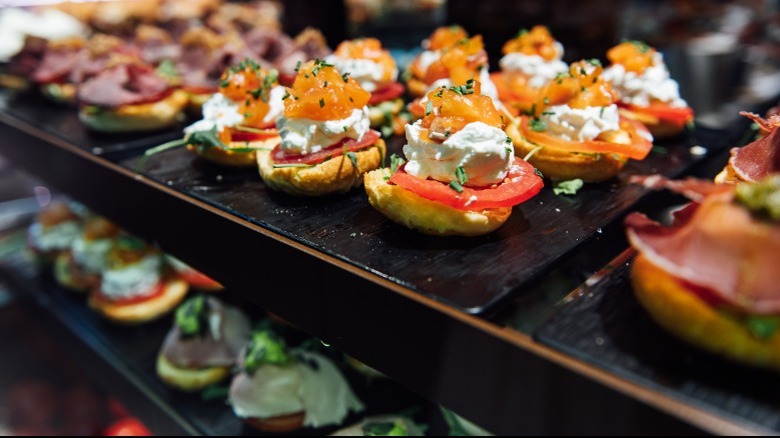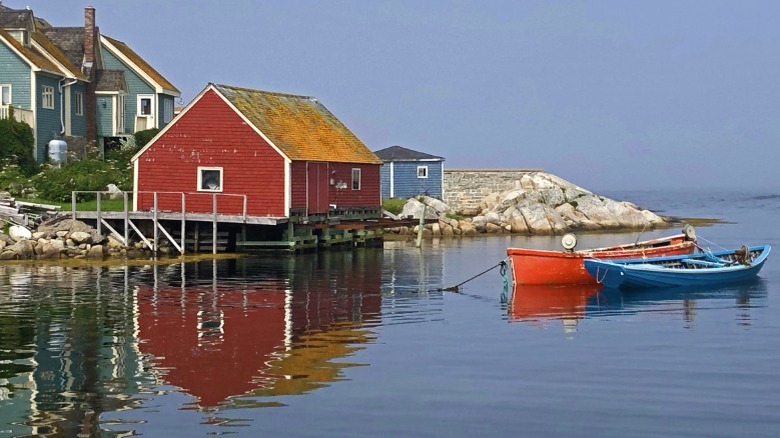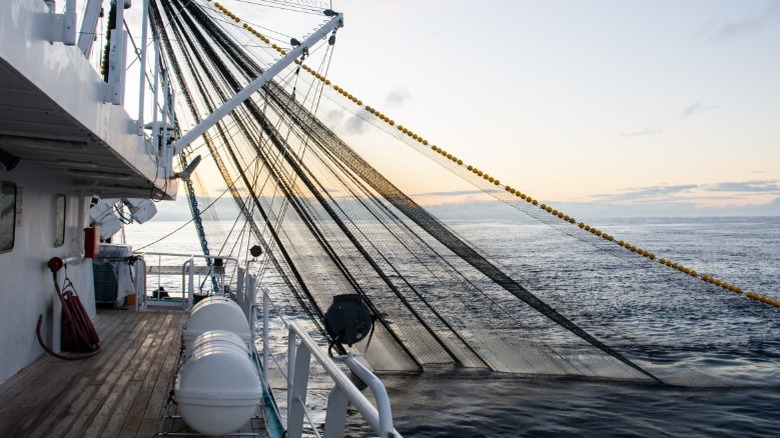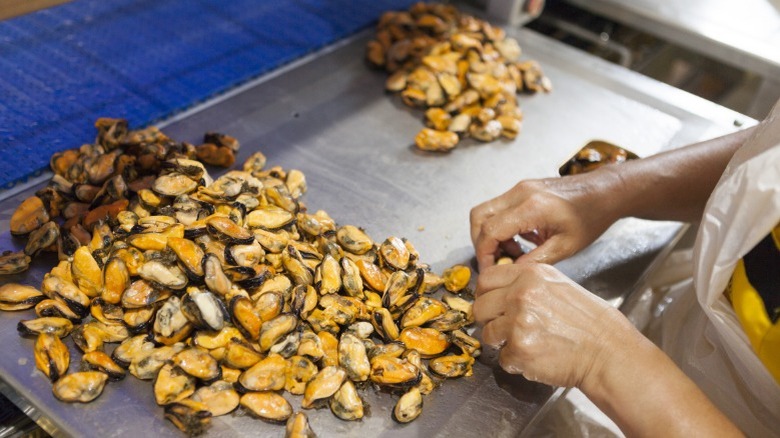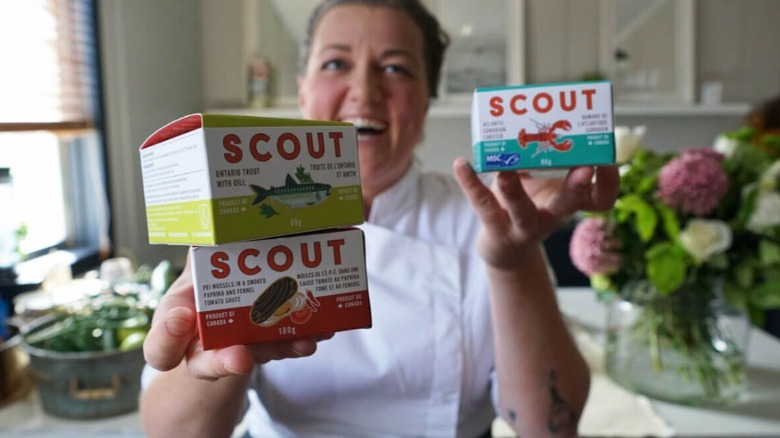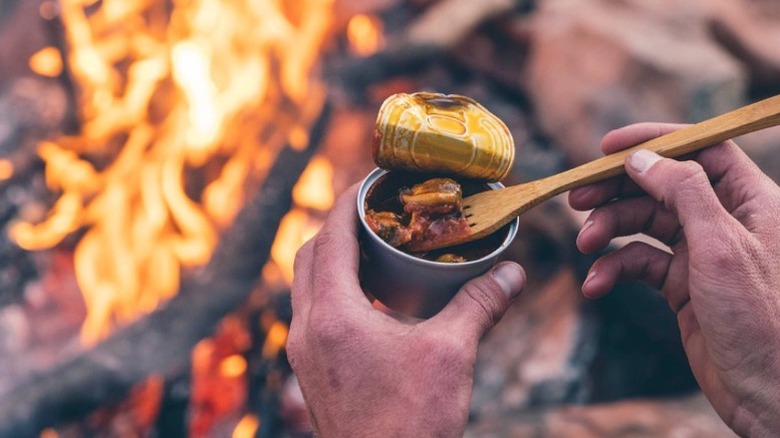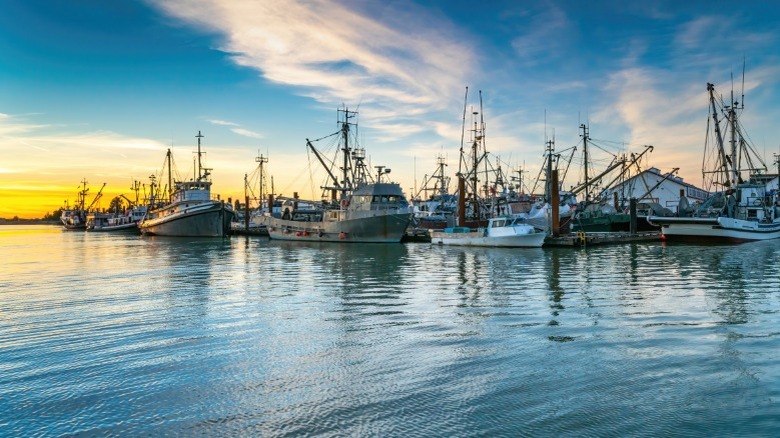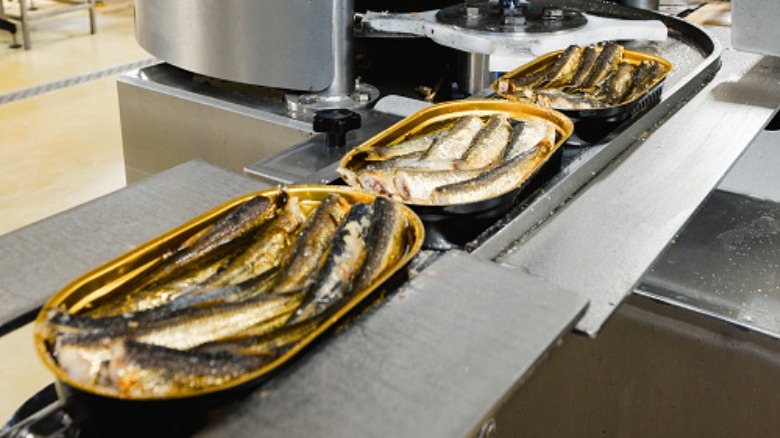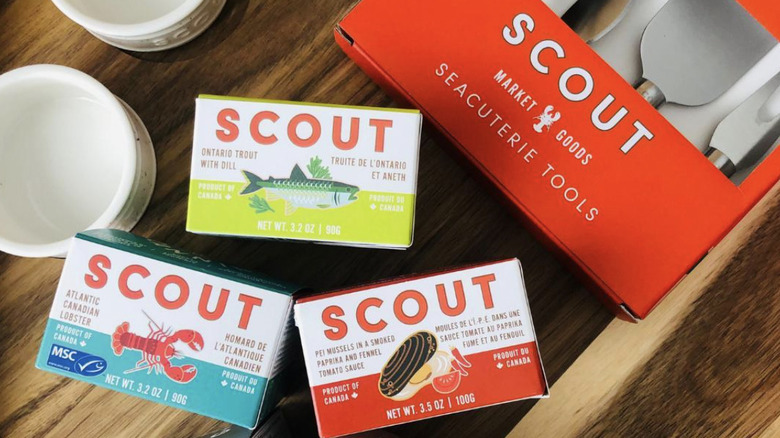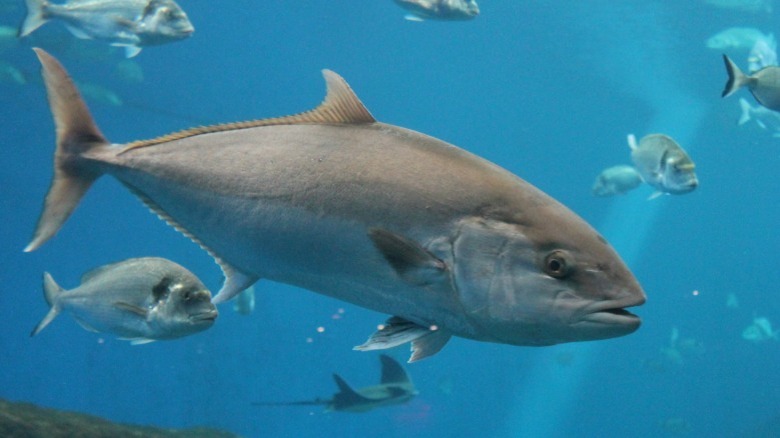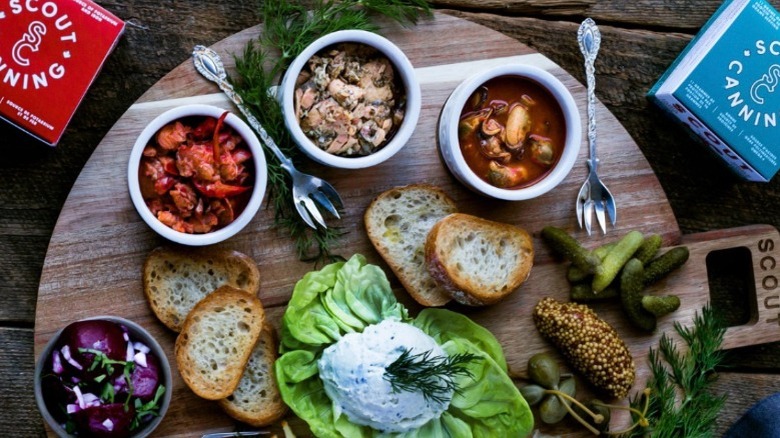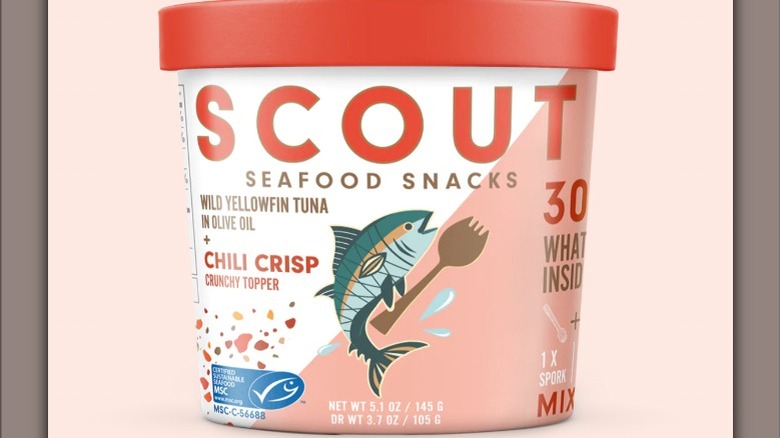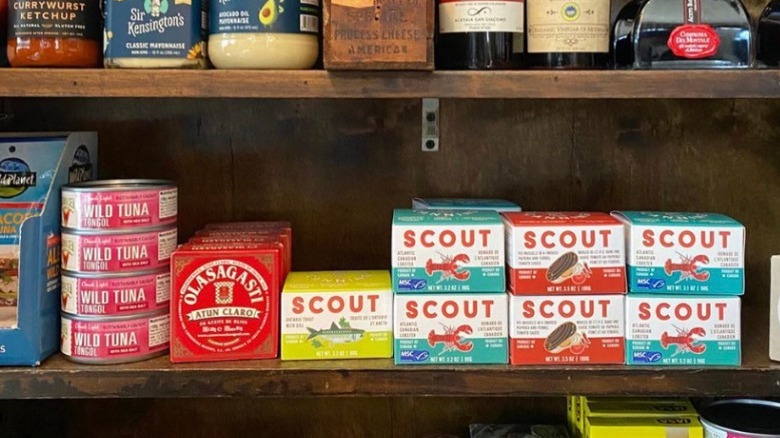Everything You Need To Know About Scout Canned Seafood
Have you heard about tinned fish and its recent glow-up? No, seriously. What you might have previously thought of as a cheap pantry staple for when you're too tired to cook, cans of seafood have suddenly become, well ... posh. And delicious. When we might have once been tempted to slice up some meat and cheese and call it a party, we're now all going mad for fish, honey. But not just any fish. Tins of sustainable, flavor-packed, chef-inspired nutritious goodness are all the rage. Channel your inner Spaniard and reach for a few tins for your next tapas-fueled snack.
We're talking about truly delicious and feel-good options here. Look beyond the cutesy packaging (although Scout does have that in spades), and read on to find out why you should be choosing food that's not just good for you, but also benefits the world around you. With more than half the world relying on seafood as a main source of protein, we can't afford to let it go to waste. Scout encourages us to look beyond the top three choices — shrimp, salmon, and tuna, the so-called beef, pork, and chicken of the sea — to try options like mussels and trout, with more tempting species on the way.
Tinned fish has recently become trendy again
If you've been paying attention to food news, and if you're here you're definitely one of us, then you'll have noticed that tinned fish is making a big comeback. And we're not just talking about anything with a mascot named Charlie. The notion of making those tins, or conservas as they're called by people in the know, the centerpiece of cocktail hour or afternoon snack has hit the big time in North America. Forget the emergency kit staple that's packed in water and flavorless, we're talking about the good stuff folks.
TikTok has discovered tinned fish and it's having a moment, as they say. In the summer of 2021, San Francisco-based chef Ali Hooke posted a video of what she called a "tinned fish date night" and from there, the idea spread like wildfire on the social media platform. Similar to charcuterie, people are now getting into the idea of opening a few tins of high-quality seafood, toasting some bread, dishing up some pickles and olives, and enjoying those picky bits with a glass of wine. And Hooke has continued the date night theme, featuring tinned fish date night feasts in episodes on TikTok, influencing others to do the same.
The brand was started specifically to highlight sustainable seafood
Chef Charlotte Langley started had the idea to start Scout in 2014 and spent the next six years putting together the business. Launching in September 2020 with five unique tinned options that include Atlantic lobster, P.E.I. mussels, Ontario rainbow trout, and albacore tuna that are all carefully seasoned with savory ingredients like fennel, paprika, or dill. Chef Langley was already a well-known champion of seafood dishes, working at Whalesbone (Ottawa, Ontario) and C Restaurant (Vancouver) where she gained a reputation for her innovative and passionate approach to everything aquatic. Langley teamed up with Adam Bent, former manager of restaurant review app Urbanspoon, and Nate Dunn, general manager of Uppercase retail service, and the three started the brand with a commitment to well-crafted and sustainable tinned seafood.
In late 2022, Scout received $4 million in seed money from Semillero Partners, a growth-stage investment firm, Export Development Canada, and Almanac Insights, a food and tech venture fund that invests solely in hospitality and food system technology companies that are making a positive impact. Not only that, but in our very own ranking of best tuna brands in late 2022, Scout received top honors. We'll let you decide which matters more.
Scout is an advocate for sustainable seafood practices
Scout's founders started the company with convenient food — that was still delicious — in mind. Not only that, it had to be sustainable and caught in North America, making it an even bigger order. Co-founders Bent and Dunn also worked together to found Seafood Collab, a project that brings together sustainable seafood and sea-plant-based producers that are all invested in responsible ocean and waterway stewardship, as well as offering innovative and accountable products. Langley herself is the official Canadian Chef Ambassador for the Marine Stewardship Council (MSC) and uses her platform to encourage consumers to search out more responsible options.
By choosing to work with tinned fish, Scout is actively reducing the food waste that is so prevalent in fresh fish markets and grocery stores. The company is able to utilize imperfect, as well as what Chef Langley calls "back-end" species that would just be disposed of because another cannery won't use it. In the U.S., nearly 50% of all fresh seafood goes to waste; tinned fish helps to cut into that staggering number. Scout has recently started offering tuna and eventually salmon because of consumer demand, but part of the mandate is also to focus on those less-ubiquitous species that would otherwise go to waste.
How Scout Cannery's production process has changed
As the company has grown, its production processes have been able to improve significantly as well. What started as a chef tinkering with a vintage canning machine to preserve all sorts of foods became a company with canneries in multiple cities and distribution across the continent, so it's safe to say Scout has achieved some major growth since starting in 2014. The brand took six years before officially launching in 2020, testing recipes and finding the most environmentally and socially sustainable chains of production. It quickly became apparent that people loved the products and distribution finally started in earnest.
Going from a single kitchen to supplying a continent's worth of tinned seafood has been a big adjustment but one Scout has made with seeming ease, all while sticking to the do-better philosophy of the brand. Aiming to become one of the most trusted canned seafood sellers, Langley, Bent, and Dunn have sourced the most responsible fisheries they could find and continued up the supply chain. While it has had to expand to meet the needs of consumers, everything Scout sells continues to be processed in the traditional way of old-school conservas brands — quickly and by hand, all hand cut and packed, in order to achieve peak quality when you pop open a tin.
The company relies on culinary-forward offerings
As you may have already surmised, Scout cannery wasn't just opened by your run-of-the-mill seafood purveyor. Charlotte Langley grew up in Prince Edward Island, Canada, a place known for spectacular vistas, unbelievable friendliness, and superb seafood. The island is home to many small fishing towns that are all packed with tourists in the summer months, and tourists that aren't all looking for Anne of Green Gables, either. The appeal of fresh-caught Atlantic lobster never gets old and Scout uses that to its advantage, catching the crustaceans right off the dock at their maritime cannery. The same goes for the rope-grown mussels that are farmed just down the road, before being tinned with a lush-sounding paprika and fennel tomato purée.
The company relies on incredibly fresh seafood but that's not all. Rather than just packing it up and shipping it out, all of Scout's products are seasoned to ensure optimal enjoyment. The offerings are given restaurant-quality treatment, thoughtfully seasoned so that consumers don't have to worry about how to serve any of it — often, a slice of fresh warm bread is enough. With her background of over 15 years in top-rated Canadian restaurants, Chef Langley knows how to make seafood sing.
Focused on changing the public perception of tinned fish
The days of cracking open a can of tuna, glopping in some mayo, and spreading it on Wonderbread are over, our fish-loving friends. We get it, sometimes we crave that old-school comfort, too. But more and more, consumers are looking to the recent trend of conservas (those little bites of exquisitely preserved, tinned seafood) for a cocktail hour snack or light dinner. There isn't much easier than warming a baguette, opening a jar of something pickled, and reaching for some divine oil-packed mussels, is there?
With the recent revival in tapas bars, as well as people looking to eat well at home, gourmet tinned fish has made a comeback. Brands like Scout are focused on customer experience with crave-worthy flavors and impeccable product design, making the cans and comestibles more elegant than what you might remember from your last tuna melt. Or course, it comes at a higher cost but consumers are using those dollars to support ethical fishing practices while eating better themselves. Scout Cannery's tins allow customers to eat exquisitely at home without doing a lot of work to make an entire meal, using products that they can trust and feel good about buying.
It sources 100% of the fish from the U.S. and Canada
By looking to seafood that isn't just that ubiquitous net-caught shrimp, salmon, and tuna, Scout offers more diverse options in order to show consumers that all marine life is worthy of a fancy-schmancy conservas treatment. Rainbow trout and mussels, for example, make exceptionally tasty choices. Hoping to entice consumers away from the more environmentally problematic seafood, Scout does offer salmon and tuna, that are both fished in a way that significantly reduces unintentionally caught (and wasted) marine life.
By working with comparatively small fisheries, Scout is able to trace its catch from boat to fork, as they say. This also means that the fisheries are all located within North America, making Scout the only cannery to do so. All this and some pretty tasty products to boot. This is important for a few reasons, transparency being only one of them. Fishing boats that are close to their canneries make for better, fresher canned fish that are easily identifiable to the North American market. Middle America (and middle Canada!) knows and loves rainbow trout, so why wouldn't we buy it? Cutting down on travel time also cuts down on cost, which makes its way to the consumer. Finally, it helps to support the community financially, which is one of Scout's basic tenets.
A 100-year-old machine inspired the owners to revive the art of canning
Nearly a decade ago, Chef Charlotte Langley found an antique canning machine, all 500 pounds of it, bought it from a guy who didn't want or need it, and for a few hundred dollars it started her on her way to seafood success. Living in Toronto, Langley began to churn out ready-made meals that, at first, had very little to do with seafood — mini tourtieres for Christmas (an iconic Canadian meat pie), fresh veggies, desserts, and even the occasional cocktail all had their turn being canned. But the love of seafood never left the P.E.I.-born chef.
In a prescient 2015 article in the National Post, Langley talked about her desire to open a cannery in her hometown, to be able to give jobs back to the people she grew up with. She spent years perfecting the practice of canning with that antique machine, learning about pH levels and ingredient combinations, and teaching herself the important aspects of recipe development. Not only did it give her hands-on experience but it also imbued her with an even deeper respect for those people who made fishing and canning their livelihood. While the antique machine may no longer be in use, it served as a vital part of Scout's genesis and Langley's education.
Scout aims for complete transparency from boat to consumer
Currently, Scout Cannery is the only North American fishery that uses fish caught exclusively on this continent, from the Atlantic and Pacific oceans, and Lake Huron. This means that there's no imported seafood being needlessly shipped in and everything is caught, processed, and canned in a timely manner with very little travel time. The commitment to responsible seafood means that the tuna from British Columbia gets canned in B.C., while the lobster and mussels from P.E.I. are packed in that province (as we mentioned previously, the maritime cannery is at the end of the dock, remember). This doesn't just help with environmental issues, but it also means that your can is full of much fresher fish than the previously frozen fish your supermarket is offering.
The company has pledged complete transparency from its boat to your plate and consumers can go to the website to read about where the fish comes from, and how it's been caught and prepared. Using both farmed and fished species, Scout is very open about its commitment to aquatic sustainability and has the credentials to prove it. From being involved with the Marine Stewardship Council to achieving B Corp certification, the company has also pledged to donate to 1% For The Planet, an organization that certifies reputable giving and prevents greenwashing.
The impact program provides support for environmental and social issues
Not only does Scout Cannery focus on marine sustainability and biodiversity, but the co-founders also place a lot of importance on social issues. From something as simple as paying a living wage to everyone on the supply chain to issues like "sea slavery" and First Nations equality, Scout has made impressive and positive inroads with issues that impact everything that their seafood touches. The impact program focuses on opportunities that benefit the planet and people. The company is hoping to support a number of First Nations-led environmental projects, specifically in the areas it sources seafood from, including partnerships and other collaborations.
The Not For Sale organization, which Scout has also partnered with, focuses on human rights, human trafficking, and modern slavery, all issues that are incredibly problematic within global seafood. Seafood remains one of the last bastions of wild-caught protein and therefore, people are always searching for ways to capitalize on it, no matter the cost to humans or the environment. In an article published by the New Hope Network, co-founder and CEO Adam Bent highlights the problem of forced work with little to no pay on fishing vessels, only for the profit of the company, subjecting workers to unsafe conditions and often abuse.
Why the company believes good tinned fish should cost more
With the advent of chef-quality tinned seafood, consumers can also expect to pay more for it. But cheap tuna tastes like, well ... cheap tuna with a side of environmental angst. Incorporating elevated recipes and ingredients (think yellowfin in olive oil with crunchy chili crisp), this isn't the canned tuna of your youth. Scout's offerings cost more, absolutely, but there's a good reason for that. A few good reasons, actually. Sure, a can of their lemon-infused olive oil-packed lobster knuckles will set you back about $25. But how much easier is it to just open a can and serve, rather than buying an entire lobster and struggling with opening that instead? Sometimes, it pays to have someone else do the hard work for you.
Beyond that, Langley believes that introducing the conservas culture (tinned fish as a delicacy, not just a cheap meal) of Europe to North Americans will ultimately help reinforce the notion of sustainable seafood. Scout's products cost more because the entire supply chain has been designed with the ethos of sustainability, environmental and social, in mind. This also means that everyone is well paid along the supply chain and supports the communities that help supply the products, which is always a good thing.
A snack kit line launched in early 2023
Not content with only developing superb tinned fish options, Scout has recently teased a trio of snack kits, making it simple to eat well on the go. A short video on Scout's Instagram shows the chef tucking into one, highlighting just how easy it is to make a nutritious and delicious snack. On the Scout website, consumers can pre-order six packs for delivery starting in mid-April 2023. A quick tour through other Instagram posts shows some pleasingly teasing shots of the new product line, including gorgeous pics of those flavor-packed crunchy toppers. No more time wasted trying to figure out what goes with fish is always a winner for us.
Packed in containers that look curiously like fish-flavored ice cream at first glance, the kits are an excellent option for the mid-afternoon munchies. Crack the lid on one of these pints and inside you'll find a compostable bamboo spork, a tin of tuna, and an adorable little bag of toppings. Open the can, scoop it into the container, add your crunchy topping, and go to town with that spork. So far, your flavor choices are za'atar, crunchy chili crisp, and chile jalapeño, all of which sound awfully appealing.
Where you can find Scout's products
The Scout website is a great place to start, of course. Since its launch in 2020, Scout has become a very popular option for conservas, especially among consumers who appreciate the values that the company stands for and practices. At the time of writing, the product range was 12 products, including the new snack range, but in a recent interview with Sweet Potato magazine, Langley confides that she's working with 12 to 14 new species in order to diversify the available options, as well as bringing attention to fish that aren't solely tuna or salmon as part of her commitment to seafood preservation. The issue of overfishing is never far from Langley's mind and she hopes that by showing consumers there are easy options for enjoying some of the more intimidating species of seafood, customers will move away from less sustainable options.
On the website's location page, there are currently 1074 brick-and-mortar locations carrying the products, with the majority in the U.S., including Whole Foods, Eataly, Erewhon, and Farm Boy markets. The tins are also available at a number of high-end gourmet food and cheese stores (Zingerman's and the like) so if you're lucky enough to have one in your neighborhood, that might be a good place to start.
